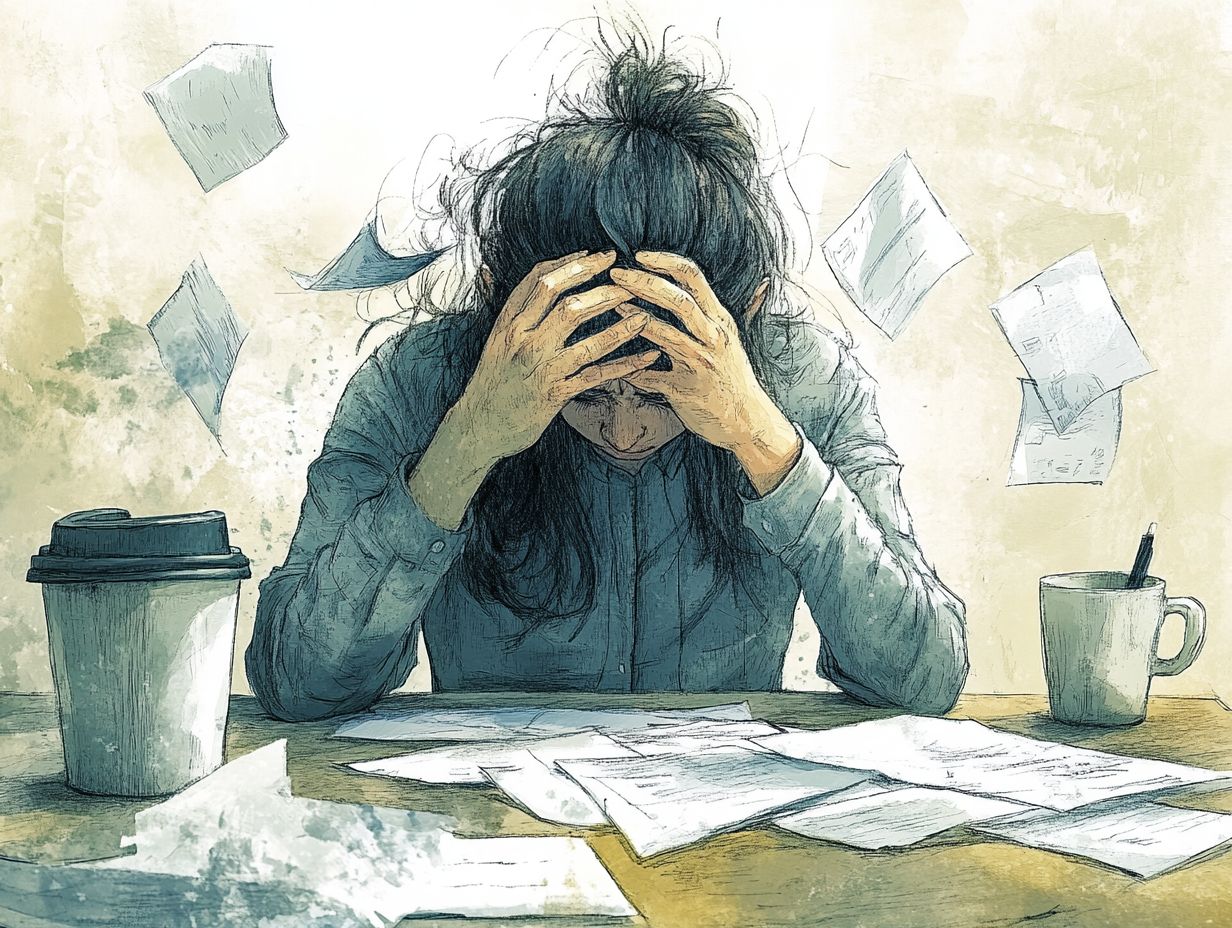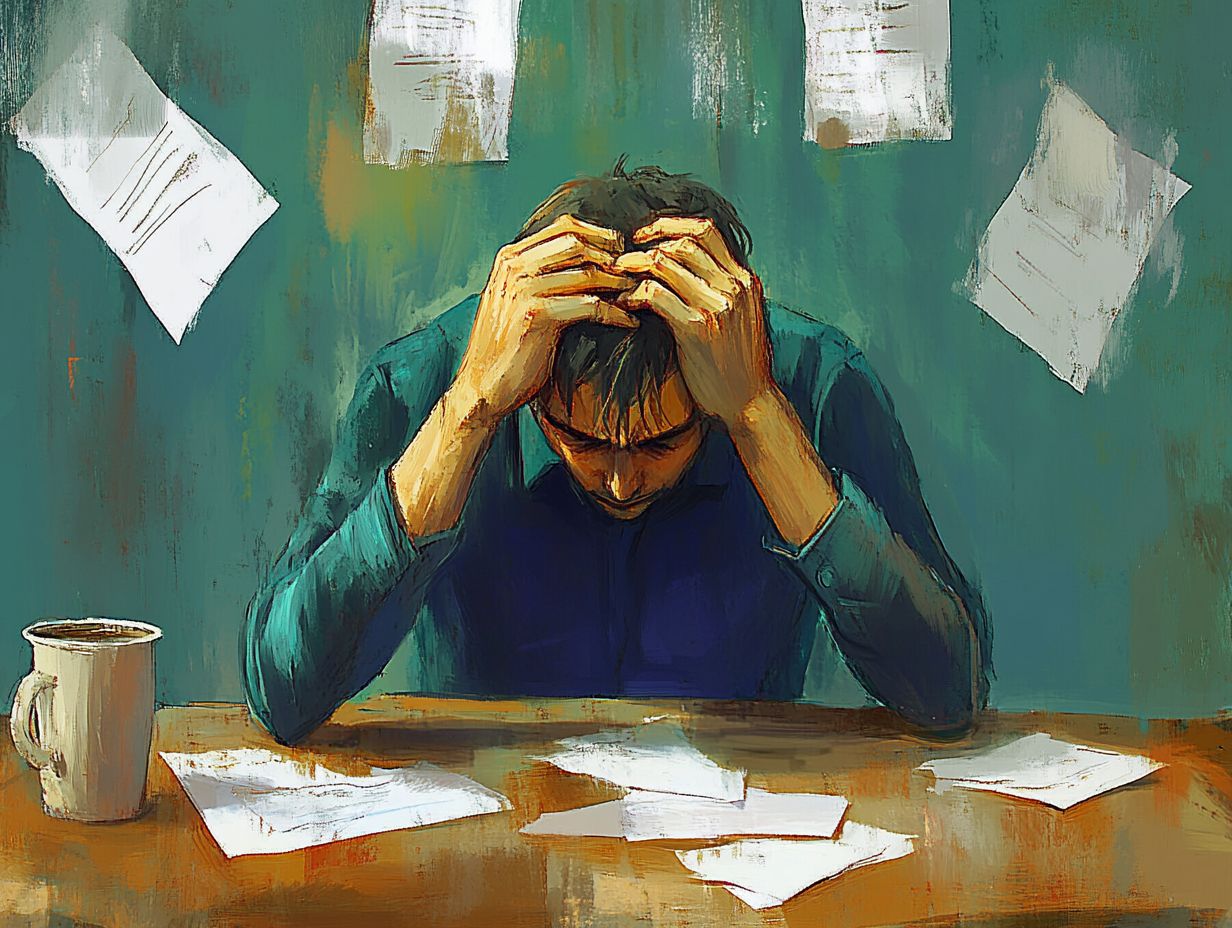Recognizing Behavioral Signs of Stress
Stress is a universal experience that touches everyone at some point in their lives. This article delves into the definition of stress and examines its effects on both your mind and body.
It reveals the physical and behavioral symptoms that can alert you when stress begins to take its toll.
Within these insights, you will discover effective coping strategies and practical tips to prevent stress from infiltrating your daily life.
By understanding these elements, you ll empower yourself to manage stress more effectively and enhance your overall well-being.
Contents
Key Takeaways:

- Stress affects both the mind and body. It’s important to recognize the physical symptoms and behavioral symptoms to manage it effectively.
- Changes in behavior, such as excessive worrying or irritability, can be indicators of stress and should not be ignored.
- Coping with stress requires finding effective strategies, including self-care, relaxation techniques, and seeking support from others.
Understanding Stress
Understanding stress is essential for anyone seeking to enhance their mental health. It encompasses a spectrum of emotional, behavioral, and physical responses that can greatly impact your health.
Stress can present itself in various forms. Acute stress is triggered by sudden events, while chronic stress persists over time. These types often stem from your personal history, cultural norms, and unique personality traits.
Recognizing these influences can help you craft effective stress management strategies that are vital for mitigating adverse health effects linked to stress, such as anxiety, depression, and long-term health issues.
Defining Stress and its Effects
Stress manifests as a state of mental or emotional strain, often stemming from challenging or adverse situations. It affects you on multiple levels physical, emotional, and behavioral.
When you encounter stress, you may frequently experience a variety of physical symptoms that lead to discomfort. You might grapple with hives that itch or feel an overwhelming fatigue that turns even the simplest tasks into monumental challenges.
On an emotional level, stress can amplify feelings of anxiety. It may sometimes spiral into deeper issues like depression that linger long after the initial stressor has faded. Behaviorally, you might find yourself resorting to actions such as nail biting or withdrawing from social activities, isolating yourself further from the support you need.
Grasping these diverse responses sheds light on the crucial role of effective coping mechanisms. These include support systems, enabling you to navigate your unique challenges with greater proficiency.
Physical Signs of Stress
Physical signs of stress can reveal themselves in various forms, such as headaches, muscle tension, or gastrointestinal issues. These symptoms are your body’s way of telling you something’s wrong!
Recognizing Stress on the Body
Recognizing stress in your body means being attuned to specific physical symptoms that arise from it, such as fatigue, tension, and shifts in appetite. These clues can offer valuable insights into your mental health status.
Pinpointing these signs is essential, as they often act as indicators of underlying issues that may need your attention. Regularly monitoring these symptoms can be beneficial, helping you understand your stress patterns and triggers more clearly.
Embracing lifestyle changes like consistent exercise, a balanced diet, and mindfulness practices can significantly reduce these physical manifestations and elevate your overall well-being.
Healthcare providers are integral to this journey, offering personalized interventions, community support, and stress assessments that enable you to manage your symptoms effectively.
Behavioral Signs of Stress
Behavioral signs of stress may manifest as noticeable changes in your demeanor, such as heightened irritability and a tendency to withdraw from social interactions. You might adopt unhealthy coping mechanisms like substance misuse or compulsive behaviors, including nail biting and skin picking.
Recognizing these signs is essential to understanding and addressing the stress you may be experiencing.
Identifying Changes in Behavior

Identifying changes in your behavior due to stress means observing shifts in your social interactions and emotional responses. These changes can signal the need for help.
Understanding these changes is important, as they often point to deeper emotional turmoil that, if neglected, may lead to unhealthy coping mechanisms. You might find yourself withdrawing from friends and family or feeling more irritable. Both are strong indicators that support could be beneficial.
Emotional reactions can range widely, from anxiety and frustration to sadness. Each of these emotions influences your behavior in unique ways.
This is where a solid support system proves invaluable. Having trusted individuals who can offer encouragement and understanding is crucial to navigating these challenges.
Now is the perfect time to explore healthier coping strategies! Mindfulness practices, physical activity, or creative outlets can transform how you handle stress. These strategies can effectively replace harmful habits and foster resilience, ultimately leading to better stress relief.
Coping with Stress
Effectively coping with stress is essential for maintaining your mental well-being. This can encompass a range of strategies, from practicing relaxation techniques to reaching out for support from healthcare providers and community resources.
Effective Strategies for Managing Stress
Effective strategies for managing stress often involve a blend of lifestyle changes, coping mechanisms, and the use of support systems. This creates a well-rounded approach to stress relief.
By adopting a balanced diet and integrating regular exercise into your daily routine, you can significantly reduce your stress levels. Engaging in physical activity not only lifts your mood through the release of endorphins, but also instills a sense of discipline and accomplishment.
Similarly, nourishing your body with an abundance of fruits, vegetables, and whole grains can greatly enhance your overall emotional well-being.
Exploring community support options, such as joining local wellness groups or participating in workshops, can help you forge invaluable connections. Cultivating a strong personal support system is essential for fostering resilience and encouraging open conversations about stress.
This comprehensive approach underscores that managing stress isn t solely about individual efforts. It s equally about creating a supportive environment with strong social networks.
Preventing Stress
Preventing stress is vital for your overall health and wellness. You can achieve this through thoughtful lifestyle changes, cultivating effective coping mechanisms, and building robust support systems.
By prioritizing these elements, such as lifestyle changes and effective coping strategies, you enable yourself to navigate life’s challenges with greater ease and resilience.
Tips for Reducing Stress in Daily Life
Reducing stress in your daily life is achievable with simple yet effective strategies that promote relaxation, encourage lifestyle changes, and incorporate healthy coping mechanisms. These coping options can profoundly impact your overall health.
By embracing specific relaxation techniques like deep breathing exercises or mindfulness meditation a technique that helps you focus on the present you can significantly lower your stress levels. Time management also plays a crucial role; for instance, crafting a daily schedule that includes breaks can help prevent overwhelm.
Welcoming positive lifestyle changes, like regular physical activity, maintaining a balanced diet, and ensuring adequate sleep, can enhance your well-being. Make small adjustments now for big results in your life! These minor shifts can collectively lead to a more balanced and fulfilling life, allowing stress to take a backseat in your everyday experiences.
Frequently Asked Questions
What are some common behavioral signs of stress?
Some common behavioral signs of stress include changes in eating habits, increased alcohol or drug use, social withdrawal, and difficulty concentrating. For pet owners, it’s important to recognize that the signs of stress in birds may manifest in actions like nail biting or skin picking.
How does stress affect behavior?
Stress can manifest in various ways, such as irritability, restlessness, and difficulty sleeping. It can also lead to changes in behavior, including increased aggression or impulsivity. Understanding the fight-or-flight response can help explain these reactions.
Can stress cause physical symptoms?
Yes, stress can cause physical symptoms such as headaches, muscle tension, and stomach problems. These can be accompanied by behavioral changes, such as increased anxiety or overeating.
What are some early signs of stress?
Some early signs of stress may include changes in mood, increased or decreased energy levels, and difficulty managing emotions. These can also be accompanied by changes in behavior, such as social isolation or excessive worrying.
How can I help someone who is showing behavioral signs of stress?
It is important to approach the person with empathy and understanding. Encourage them to talk about their feelings and offer your support. You can also suggest seeking professional help if needed, as they can provide coping strategies and healthcare interventions.
What are some healthy ways to manage stress?
Take the first step towards a stress-free life today!
Healthy Ways to Manage Stress
Managing stress effectively is essential for your well-being. Try exercising, practicing relaxation techniques, or talking to a trusted friend or therapist.
Finding healthy outlets for your emotions, like journaling or creative activities, can also be beneficial. Simple lifestyle changes can help you feel more relaxed.

Early Signs of Stress
Be aware of early signs of stress like mood changes, fluctuating energy levels, and difficulty managing emotions. You might notice behaviors like social withdrawal or excessive worrying.
Helping Someone in Distress
Approach them with empathy. Encourage open conversations about their feelings and offer your support.
If necessary, suggest they seek professional help for coping strategies.
Common Behavioral Signs of Stress
Look for signs like changes in eating habits, increased substance use, and difficulty concentrating. Actions such as nail biting or skin picking can also indicate stress.
Effects of Stress on Behavior
Stress can lead to irritability, restlessness, and sleep issues. It may also result in aggressive or impulsive behaviors.







